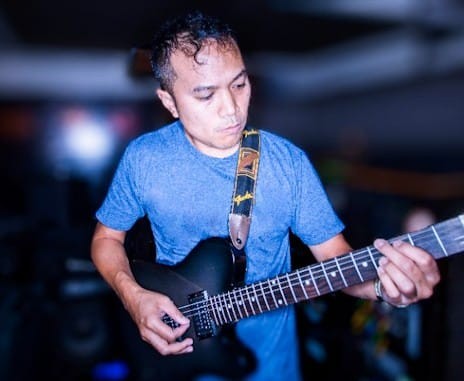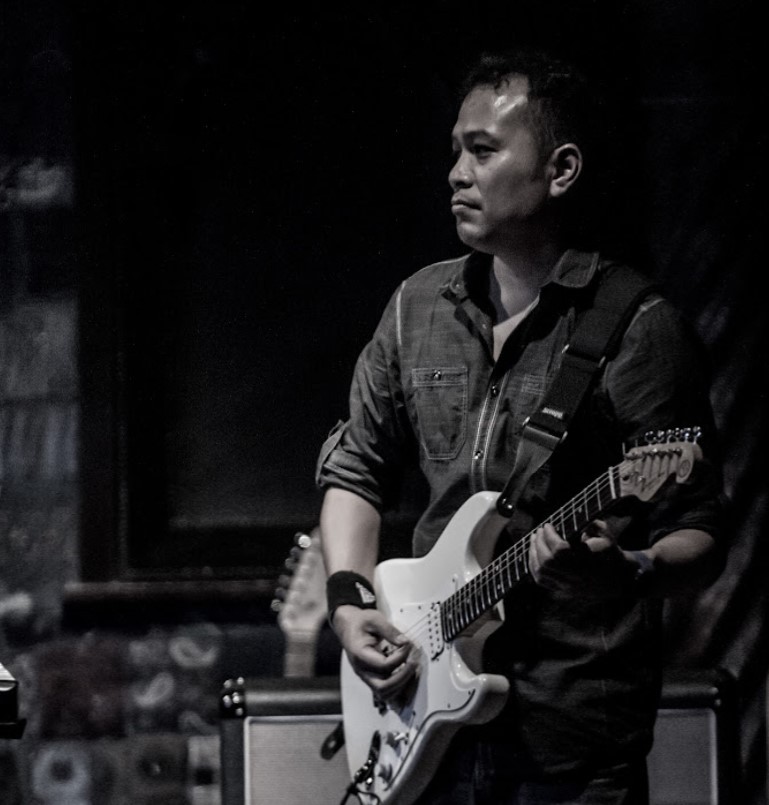We were lucky to catch up with Ken Sarmiento recently and have shared our conversation below.
Ken , thanks for taking the time to share your stories with us today. How did you learn to do what you do? Knowing what you know now, what could you have done to speed up your learning process? What skills do you think were most essential? What obstacles stood in the way of learning more?
Thanks so much for having me! I appreciate the opportunity to share my musical journey. I learned piano by watching my mom and brother’s piano lessons at home. I discovered I could hear music and started playing it on the piano.
For drums, I learned by watching others. I listened to many rock bands as a kid and emulated their playing. Taking drum lessons also helped me.
I had a lot of friends that played guitar. I learned guitar by watching them play. Like many, Jimi Hendrix influenced me early in my teens. But my good friend and Phuz bassist Edwin Casapao introduced me to funk and soul styles that added a new element to my guitar playing. I was into funky guitar players like Steve Brand from Ten Hands, John Frusciante, Vernon Reid, and Gavid Dodds from Jamiroquai. I got into blues too. But being in a band and jamming with other musicians is where I learned the most about playing guitar.
Knowing what you know now, what could you have done to speed up your learning process?
To be honest, I wouldn’t change the process. I’m constantly challenging myself to get better, and that’s most important to me as a growing musician even with many years of experience.
What skills do you think were most essential? What obstacles stood in the way of learning more?
My listening ability has to be one of my most critical skills as a musician. To be able to audiate what’s in my head and translate it into writing a song is a skill I don’t take for granted.
My high expectations are an obstacle I struggle with that will forever be with me. It can be crippling as a songwriter because you always search for perfection. I’ve learned to let go and move on with music things, but it isn’t easy.


As always, we appreciate you sharing your insights and we’ve got a few more questions for you, but before we get to all of that can you take a minute to introduce yourself and give our readers some of your back background and context?
For folks who may not have read about you before, please tell our readers about yourself and how you got into music.
I’m a musician from Houston, Texas. I was born in Chicago and grew up in Northeast Ohio. My parents were both born in the Philippines. Although my mother is a retired nurse and my father is a retired chemical engineer, both sides of my family are very musical. Maybe it’s a Filipino thing (laughs).
I started playing piano around seven, taking lessons at a music store. It didn’t last very long. I had no patience to open a piano book and learn. A couple of years later, my mom bought us a piano, which finally interested me in playing piano. I wrote my first song about a funny kid that used to spin around on those playground carousels. I started my first rock band in 6th grade, where I played the keyboard. I started playing more drums when the drummer left his kit at my house. I eventually got my drum set for Christmas in middle school and took drum lessons. I ultimately picked up the guitar in high school, motivated to write original music.
Moving to Houston after high school and attending the University of Houston, I joined and helped launch the band, Phuz. It was my work in Phuz that I’m probably most notably known for and creating the “phuzaxeman” branding with guitar-related companies. Although the early 2000s US tours with Sade and Tony Bennet brought Phuz to the limelight, Phuz’s local shows included some of the best DJs in the city that crossed barriers with live music and various “dance” genres. It was a fantastic scene to witness. You had people that were house, down-tempo, and acid-jazz fans become Phuz fans.
I also formed the electronic-flavored pop-rock band Channel K and played our first show around 2013. Some of the most notable shows for Channel K include opening for national acts like Canadian rockers, The Glorious Sons, and Long Beach’s Julien K. Channel K was part of some SXSW showcases.
Finally, I recently started a new project called Zenjii. The name came from a retro 80s Atari puzzle game. I released a single last summer called Phlow, which started as a song I created from a graduate school project at Tarleton State University.
What type of service do you provide?
Working in the music studio on projects can be a lot of fun. It’s a different mindset recording tracks on an album or editing sound for a commercial release. As a music producer, I’ve worked on projects that include mixing tracks, remixes for performances, transferring tape to digital formats, live recording, recording vocal tracks for weddings, and producing my albums.
Some other music-related work included private guitar instruction and vocal coaching. I’ve consulted other upcoming artists too. I’ll also record some music on social media to support the companies that help me through endorsements/partnerships.
What do you think sets you apart from others?
Every musician has a unique musical journey. Music is a great way to bring people together.
When I’m songwriting, I approach the writing process from different angles using different instruments. While most of what I start writing begins with a guitar part, I also have written songs with the synthesizer or piano. The Phuz song “Say to You” was one of the first songs I’ve helped write that didn’t have any guitar parts. For years, all of the Phuz songs used guitar. Instead, I used a piano and added synthesizer textures during the choruses for that particular song. During the Phuz shows, I created all those instrument sounds. I’ll have both guitar and keyboard rigs set up.
When I produced singer/songwriter Julin, many of her R&B songs I helped write were on electric keyboards using Rhodes and Wurlitzer sounds. So I wanted to capture some of that old R&B electric piano feel.
The beat of a song is vital to me in feeling the music. So, creating the rhythm before the guitar or keyboard of a song can add a different approach to the songwriting process. For the Phuz song “Cry,” drummer Edward Casapao and I worked on creating the piece using a beat sample. That particular beat added so much texture to the music.
Finally, the bass instrument adds a different element and color to a song. For example, when writing the Channel K song, Temptation, my cousin Raul Sarmiento and I created this rhythmic bass line that flows with my synthesizers during the verses. It’s really cool having a bass line start a song. Temptation is one of my favorite Channel K songs ever. That guitar solo was also so fun to play. When you create music using different instruments, it adds variety to the approach in songwriting.
The business side of music can be very challenging for an artist. Without the popularity of some well-known famous guitarists, I’ve had several endorsements/sponsorships/partnerships over the years. I’m currently working with a few guitar-related companies. My latest endorsement is with a creative guitar pedal company in California called VVCO Guitar Pedals. They make these cool custom guitar pedals. I thought of taking the original Nintendo controllers and making them into a guitar delay pedal. VVCO brought my idea to life. How cool is it to look down at your guitar effects and see one of those retro Nintendo controllers on your board? There were many positive responses on social media about my new pedal concept.
What are you most proud of, and what do you want the fans to know about your work?
There are a lot of things that have made me happy over the years. It’s somewhat tough to pinpoint something that I’m most proud of. Not too long ago, on DJ Flash Gordon Park’s Podcast podcast show, my old band Phuz was selected and archived by the City of Houston as a historical contributor to the city’s cultural development. What an honor to be part of Phuz and be in a band that DJ Flash called “legendary,” which helped formulate the history of Houston music. What Phuz accomplished from about 1998-2007 was pretty amazing. I thank my bandmates for creating the music and the hard work they put into all the shows and events. Being a part of Phuz set the foundation for other music endeavors.
In terms of something I would like others to know about my work, I put a lot of heart, soul, and ideas into helping write the songs. Whether it was Phuz, Channel K, Julin, or Zenjii, each piece has a special meaning. From a live performance standpoint, I put in a lot of work to ensure I’m at my best.


We’d love to hear a story of resilience from your journey.
In high school, I was taking drum and percussion lessons from an instructor named Bob Alexander. He was an older jazz drum instructor at a music store called Village Music Shop in Chardon, Ohio. I loved going to his lessons. I had a scheduled lesson one winter evening when the roads were awful. My parents had warned me not to go, but I had my mind set on attending drum lessons. Unfortunately, I lost control on the icy roads and rear-ended another vehicle. The accident caused car damage, but I was fortunate that nobody was hurt. Looking back at that situation, driving wasn’t a bright idea. But I already had this “energy” in me with anything related to music at a young age. Not much has changed today. I’m still a determined artist with high energy and expectations.

Is there mission driving your creative journey?
There are a few goals that drive my creative journey. One goal is to continue teaching young students about music and guiding them to reach their goals. I believe in music education on many levels. It doesn’t necessarily need to be in the classroom setting.
I’m currently working on another single with the project, Zenjii. I’ve got other works and projects in the making as well. Stay tuned.

Contact Info:
- Website: www.kensarmientomusic.com
- Instagram: https://www.instagram.com/phuzaxeman/
- Facebook: https://www.facebook.com/ken.sarmiento.391
- Linkedin: https://www.linkedin.com/in/ken-sarmiento-phuzaxeman-4002b4213/
- Youtube: https://www.youtube.com/@phuzaxeman
Image Credits
Barry Dolton Photography Scot Overholser Photography


